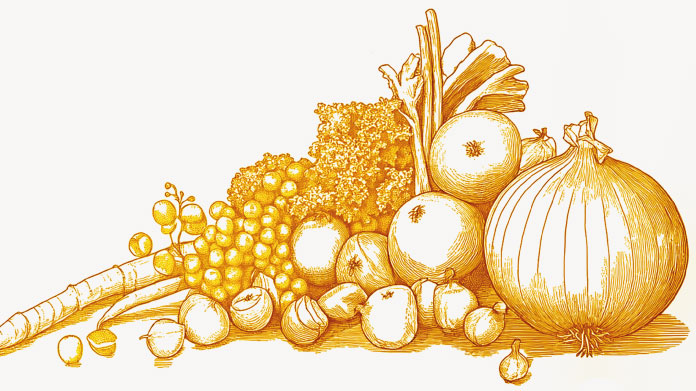10 tips to help you avoid winter ailments
Colds, flu and gastroenteritis are not inevitable! You can minimise your risk by following this simple and effective advice.

The winter months can be a real trial if you or your loved ones fall victim to a seasonal illness. Influenza, rhinopharyngitis, gastroenteritis, sore throat … such complaints are at best annoying, but they can also develop into more serious problems, posing significant risks to health. Here are our recommendations for warding off these winter ills.
Forget the kiss on the cheek …
… and the handshake too. It’s best to avoid physical contact altogether when greeting someone! Try to keep your distance from people who are ill, especially as they’re not always aware they’re infectious! So even at the risk of causing offence, refrain from cheek-kissing your friends.
To further reduce your risk of catching something, make sure you maintain impeccable hygiene. Wash your hands thoroughly several times a day as they regularly come into contact with potentially contaminated surfaces such as door handles, handrails on the tube and on staircases, counters, restaurant menus and cash machines … anything, in fact, that’s used by the general public! You should also employ good nasal hygiene. Nasal mucous membranes are one of the main barriers to respiratory pathogens so try to maintain good nasal hygiene by spraying your nostrils every day with a specific product such as a seawater-based spray.
Drink plenty of ginger, lemon and honey tea
And if you’re feeling a bit more adventurous, you could add a few cloves, some pepper and even a little turmeric - a blend that’s been shown to help prevent mild winter infections and has the advantage of tasting pretty good (as long as you’re sparing with the rather bitter cloves). It has antiseptic and soothing effects which have been used for many years to prevent colds. Grate a few centimeters of ginger and add the juice of a lemon and a tablespoon of honey for a day’s worth of herbal tea.
Thyme-based infusions have preventative and purifying properties too, while echinacea is also good for colds and flu (1).
Stock up on ‘anti-cold’ nutrients
This essentially means eating a varied, balanced diet. In winter, there’s a good range of fruits and vegetables to choose from, with those rich in vitamin C particularly beneficial as it reduces both the risk of catching a cold as well as its duration if you already have one (2). Good vitamin C choices are citrus fruits (oranges, lemons, grapefruit and clementines), kiwi fruit, and the cabbage family (cauliflower, broccoli, Brussels sprouts …). More generally, a balanced diet should provide sufficient nutrients to boost the immune system. Omega-3 fatty acids are particularly recommended here, with oily fish the most obvious source (salmon, tuna, sardines, mackerel …).
It’s also vital to stay well-hydrated: along with drinking plenty of water, you can increase your fluid intake with home-made broths, teas and tisanes to help ensure your body functions properly.
Get a good night’s sleep
Getting sufficient, good quality sleep is one of the most important elements for reducing the risk of a cold! Not only does restorative sleep have recognized benefits for the immune system, researchers have shown it has a specific effect on rhinopharyngitis (3). Sleeping for fewer than five hours a night increases the risk of catching a cold by a factor of four!
There are so many ways to help improve your sleep: relaxation, meditation, herbal teas (verbena, linden, camomile…), melatonin… Find the solution that works best for you to help you sleep more soundly and avoid winter colds.
Don’t over-heat your home
It’s tempting to turn the heating up when the weather gets cold, but germs spread more easily in a hot room. What’s more, the body naturally cools down for the night to encourage activation of its repair mechanisms. Excessively high temperatures impair this process and also dry out the mucous membranes, creating an environment conducive to bacteria and viruses.
Sotry to maintain a maximum temperature in your home of 19 degrees. You could also use a humidifier if the air is too dry.
Have the flu vaccination
It really makes sense to get yourself vaccinated against the flu before winter arrives. It will protect both you and your loved ones, including anyone who’s particularly vulnerable. While for the most part, flu brings unwelcome aches and pains and is extremely uncomfortable, it can also lead to serious complications.
The vaccine changes each year in order to adapt to ongoing mutations in strains of the flu virus. It’s safe and protects against the principal strains identified for the coming season. The over-65s, pregnant women, obese individuals and those suffering from a chronic disease are most at risk … Be sure to ask for it from your GP or pharmacist.
Take ‘winter’ supplements
Dietary supplements can boost the immune defenses and reduce your chances of succumbing to these all-too-common seasonal ailments. Andrographis is a plant with recognized benefits for mild respiratory infections (4). Probiotics help improve the body’s gut microbiome, which is ideally comprised of thousands of health-beneficial bacteria. When it’s functioning properly, this ecosystem has a powerful pro-immune effect: a course of probiotics can thus provide genuine protection against pathogenic bacteria.
Finally, a course of zinc supplements significantly reduces the duration of the common cold and can even prevent it: studies have shown that taking zinc reduces the risk of catching a cold (5). For optimal effects, choose a form with maximum bioavailability such as:OptiZinc.
Put your faith in bees
While bees are known for their vital pollinating role, it’s their production of honey and its benefits for winter health which is the focus here. In addition to soothing a sore throat, honey has a powerful antiseptic action, and can be consumed regularly as soon as the temperature starts to drop. If you’re not keen on stronger-tasting varieties (fir tree, chestnut honey …), try milder ones such as acacia and lavender, or the smooth-textured honey produced in spring. And choose cold-extracted forms as they’re better at preserving the honey’s properties.
Royal jelly, or ‘bee milk’, is primarily produced for feeding bee larvae and the queen bee. Exceptionally rich in nutrients, it boosts the immune system and thus the body’s defenses against the pathogens of winter. A course of Organic Royal Jelly just before the start of winter is an excellent idea.
Last but not least is another bee product which originally comes from tree sap: propolis. It has antiseptic and immune-stimulant effects which are particularly beneficial for fighting colds, flu and bronchitis (6). Taking propolis at the first sign of wintry weather is also a wise move! For optimum benefits, choose the most effective varieties: Brazilian green propolis, standardized in artepillin C, or the wildest and rarest form, red propolis.
Eliminate breeding grounds for germs in your home
The home is a key conduit for the spread of winter germs … While it’s obviously unwise to share toothbrushes, cutlery, or glasses, for example, we’re perhaps less conscious that things like telephones (fixed or portable), remote controls and switches are also significant sources of germs. So it’s important to disinfect them from time to time. The same principle applies to stuffed toys, tea towels, scarves and even throws: they should be washed regularly.
It’s also a good idea to air your home each day, for at least 10 minutes, in order to reduce the additional spread of any pathogens it may be housing./p>
Take regular exercise
Being physically activeboosts natural defenses and significantly reduces the risk of catching a cold. And if you’ve already caught one, the symptoms will be less severe (7). But take care – exercise that’s too intense can have the reverse effect and increase your susceptibility to viruses. Moderate activity is therefore the best option, especially as it offers many other benefits : improved sleep, less stress, and better overall health!
Conclusion
By following these recommendations, you can help lower your risk of catching a cold or other common seasonal ailment – and thus increase your chances of enjoying a relaxed and trouble-free winter!
References
- Hudson, James. (2010). The multiple actions of the phytomedicine Echinacea in the treatment of colds and flu. Journal of Medicinal Plants Research December Special Review. 425. 2746-2752.
- Anderson TW, Beaton GH, Corey P, Spero L. Winter illness and vitamin C: the effect of relatively low doses. Can Med Assoc J. 1975;112(7):823–826.
- Aric A. Prather, Denise Janicki-Deverts, Martica H. Hall, Sheldon Cohen, Behaviorally Assessed Sleep and Susceptibility to the Common Cold, Sleep, Volume 38, Issue 9, September 2015, Pages 1353–1359.
- J. Melchior, S. Palm, G. Wikman, Controlled clinical study of standardized Andrographis paniculata extract in common cold — a pilot trial, Phytomedicine, Volume 3, Issue 4, 1997, Pages 315-318.
- Singh M, Das RR. Zinc for the common cold. Cochrane Database Syst Rev. 2011, Feb 16;(2).
- J.M. Sforcin, Propolis and the immune system: a review, Journal of Ethnopharmacology, Volume 113, Issue 1, 2007, Pages 1-14.
- Nieman DC, Henson DA, Austin MD, Sha W. Upper respiratory tract infection is reduced in physically fit and active adults. Br J Sports Med. 2011, Sep;45(12):987-92.
Keywords
2 Days
My skin is clearing up nicely!
Pretty good for my skin so far.
Christian
4 Days
The new packaging is excellent
The new packaging is excellent - finally! No more squashed boxes and torn envelopes.
GORAN
5 Days
Great Product
Great Product
Larry Garrett
9 Days
Quick shipping
Quick shipping; good price. No issues!
Mary McCarty
11 Days
Thr product is very good and is helping…
Thr product is very good and is helping me on my health. Then is always on time
LUGO Luz
13 Days
Buying was fine
Buying was fine. I had problems with the website not recognizing my login info, and had to call to get it fixed. Other than that, everything was good.
David S. Clark
14 Days
Your super maca and super ginseng are…phenomenal
Your super maca and super ginseng are phenomenal supplements that compliment each other when taking them together. Fantastic feeling of well-being and lots of mid day energy without the crash.
Keith Mason
16 Days
I have had amazing results with every…
I have had amazing results with every supplement I've purchased. I am extremely satisfied with this company
kirstin Torres
16 Days
Fine products
Fine products . They are on the leading edge of online supplements. The only issue -so far-is they sometime run out of subscription items.
Jason Argos
19 Days
The ordering process is very user…
The ordering process is very user friendly and the products always come in a timely manner.
CARTER Rhonda
20 Days
The price for Dr
The price for Dr. Pero's AC-11 is reasonable and in line with his views. (my former colleague). Keep it pure.
CAMPBELL Clayton
23 Days
Right on every time.
Right on every time.
Arthur Nicholas
26 Days
They are cheaper than everyone else and…
They are cheaper than everyone else and the shipping was fast. Great company.
Patricia Adams
33 Days
Availability of quality health…
Availability of quality health supplements and it's wide variety is impressive. Ordering is seamless and shipping even during the holidays is well streamlined.
Mohamad Hussein
47 Days
A Product worth waiting for when not…
A Product worth waiting for when not available and then arriving as a surprise!
DOMINIC




